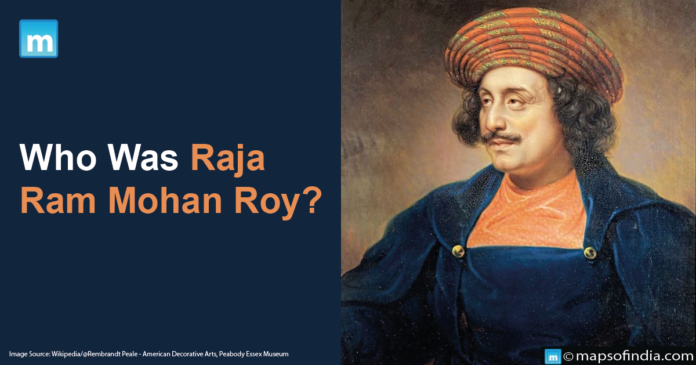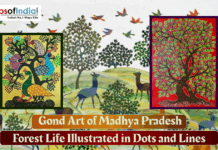Raja Ram Mohan Roy is the originator of the Brahmo Samaj (one of India’s first socio-religious reformist organisations), and was a brilliant philosopher and free intellectual. He was a religious and social reformer known as the the ‘Father of the Bengal Renaissance’ or ‘Father of Modern India’. He was born in the Radhanagar region in the Bengal Province, in May 1772, into a conventional Bengali Hindu household.
Ram Mohan’s education
- He was sent to Patna for additional studies, where he studied Arabic and Persian. He also studied the Quran, Arabic interpretations of Plato and Aristotle’s works, and Sufi mystic poets’ compositions. By age fifteen, Raja Rammohun Roy had mastered Persian, Arabic, Sanskrit, and Bangla. He could also communicate in both English and Hindi.
- He journeyed to Varanasi to study the Vedas, Hindu texts, and Hindu ideology.
- He also explored Islam as well as Christianity.
- When he was sixteen, he logically condemned Hindu idol worship.
- From 1809 until 1814, he was employed in the East India Company’s Revenue Department and as a private Diwan to Woodforde and Digby.
- He committed his career to religious, societal, and political reforms 1814.
Political and Economic Achievements
Raja Ram Mohan Roy was amazed and liked the civil rights granted to citizens under the British Constitutional System. He desired to transfer the benefits of such a governance structure to the Indian people.
Taxation Reforms
- He spoke out against the repressive practises of Bengali zamindars.
- He requested that the minimum rent be set.
- He urged that export levies on Indian commodities be reduced and that taxes on tax-free regions be abolished.
- He advocated for the termination of the commercial privileges of the East India Company.
Freedom of the press
- He spoke out against the British government’s oppressive policies, particularly the limits on press freedom. He backed the free press movement in India with his writings and activism.
- When Lord Hastings abolished press regulation in 1819, Ram Mohan discovered three journals: Mirat-ul-Akbar (1821), Samvad Kaumudi (1821), and The Brahmanical Magazine (1821)
Administrative initiatives
- He advocated for equitable treatment of Indians and Europeans. He advocated for the Indianization of superior services and the separation of the administration and the judiciary.
Contributions to Society
- He saw reformist religious organisations as agents of social and political change.
- He established the Atmiya Sabha in the year 1814, the Calcutta Unitarian Society in the year 1821, and the Brahmo Sabha in the year 1828.
- He fought for equality between men and women, such as a widow’s freedom to remarriage and women’s right to possess assets.
- His efforts resulted in the eradication of Sati in 1829 by Lord William Bentinck, the then-Governor-General of India, who opposed polygamy.
- Raja Ram Mohan Roy advocated for abolishing the caste system, untouchability, beliefs, and using intoxicants.
- He condemned child marriage, adultery, female illiteracy, and the plight of widows.
- He emphasised rationality and a modern scientific perspective.
- He battled against Hindu society’s perceived evils at the time.
- He founded the Sambad Kaumudi, a Bengali weekly journal that constantly condemned Sati as cruel and anti-Hinduism.




